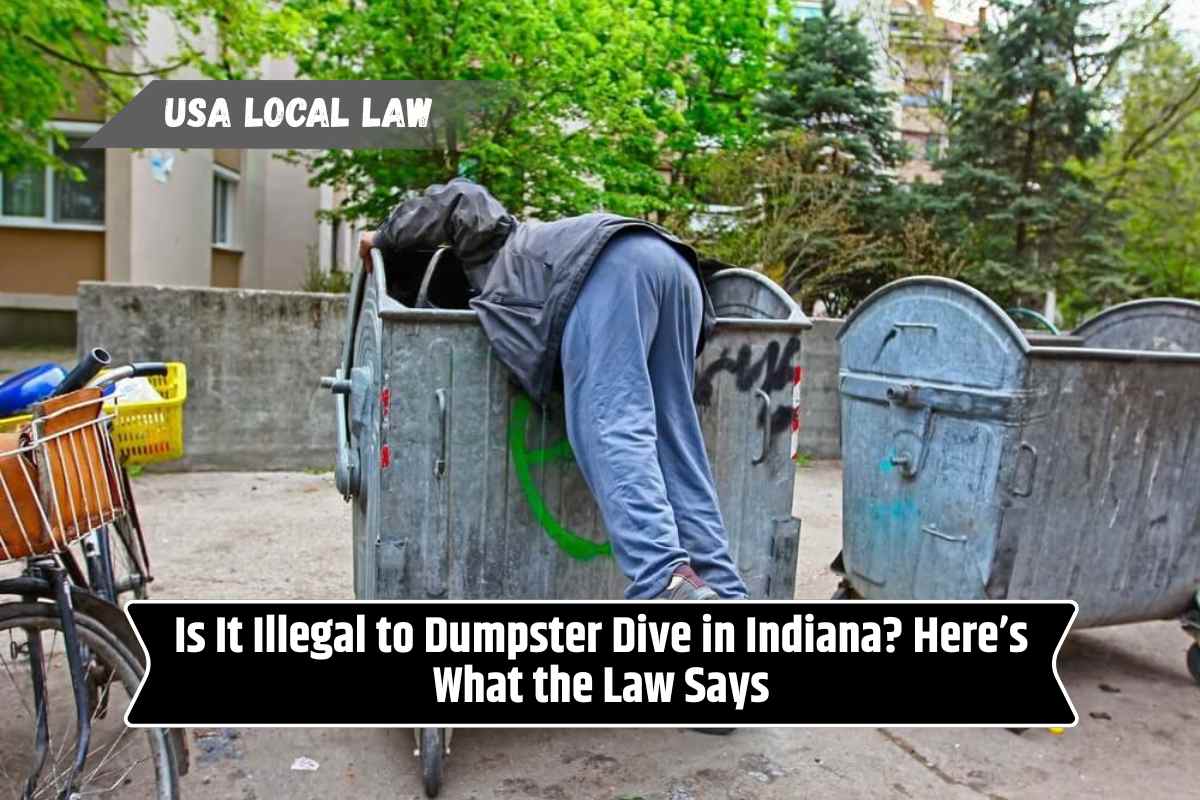Dumpster diving, the act of searching through trash bins for food, goods, or discarded items, is something many people consider when trying to find free resources.
While it may seem harmless, it’s important to understand that dumpster diving laws vary by state, and in Indiana, there are rules you need to be aware of. This article will break down what the law says about dumpster diving in Indiana, helping you stay informed before diving into any dumpsters.
What is Dumpster Diving?
Dumpster diving refers to the practice of searching through commercial or residential garbage bins, dumpsters, or trash piles to find items that can be reused, recycled, or consumed.
While some people do this to find food or household items, others may be looking for valuable discarded goods. While it might seem like an eco-friendly and budget-friendly way to find usable items, it’s important to understand the potential legal consequences.
Is Dumpster Diving Legal in Indiana?
In Indiana, dumpster diving isn’t necessarily illegal, but there are conditions that make it risky. Several factors affect the legality of dumpster diving, including where you dive, whether the items are on public or private property, and whether you’re trespassing or causing damage. Here’s a breakdown of the key laws:
Trespassing Laws in Indiana
One of the main factors that can make dumpster diving illegal in Indiana is trespassing. Dumpster diving on private property, such as behind businesses or in residential areas, is considered trespassing if you don’t have permission to be there. In Indiana, trespassing is illegal, and you could face fines or even criminal charges if caught on someone else’s property without consent.
Private Property: Most businesses and individuals own the dumpsters behind their stores or homes. If you dive in these areas without permission, you’re breaking the law by trespassing. Even if the items in the dumpster are thrown away, they still belong to the property owner until they are legally discarded. Dumpster diving in these areas can lead to fines, citations, or arrest.
Public Property: On public property, such as dumpsters located in parks or city streets, it’s generally less likely that you’ll be charged with trespassing. However, certain rules might still apply depending on the location, so it’s essential to make sure you’re allowed to access those areas.
Theft Laws
Indiana law also includes theft-related statutes that can affect dumpster diving. If you dive into a dumpster and take something that’s still considered property (even if it’s discarded), it could be classified as theft.
Theft: In Indiana, theft occurs when someone takes property with the intent to permanently deprive the owner of that property. If the owner has discarded an item but has not legally abandoned it (like leaving it on a curb but not intended for public disposal), taking that item could lead to theft charges.
Abandoned Property: If an item is clearly abandoned, such as when it is left on the curb for trash collection, you may be able to take it without facing theft charges. However, this can be tricky because some items might be left for donation or a scheduled pickup, and not necessarily for public disposal.
Local Ordinances
In Indiana, local municipalities (cities and towns) may have their own regulations regarding dumpster diving. These ordinances can include restrictions on when, where, and how dumpster diving is allowed.
For example, some cities may have noise ordinances that prevent you from disturbing the peace while rummaging through dumpsters at night. Others may have specific rules about when it’s acceptable to take discarded items, or they may require permits for dumpster diving in certain areas.
Health and Safety Concerns
Even if dumpster diving seems like a good way to find reusable items, there are health and safety risks involved. Public health codes in Indiana may prevent the public from taking certain items, especially food.
You could face fines or health-related penalties if you’re found taking food from a commercial dumpster, especially in places like restaurants or grocery stores.
Food Safety: Many health codes prohibit people from taking food from commercial dumpsters, as it might be contaminated. If you were to eat food found in a dumpster and become ill, you could be at risk of legal and health consequences.
Injuries: Dumpster diving can also be dangerous. Sharp objects, broken glass, and hazardous waste could pose serious health risks. Always use caution when diving, and make sure to protect yourself by wearing gloves and being mindful of your surroundings.
How to Stay Legal While Dumpster Diving in Indiana
If you’re considering dumpster diving in Indiana, there are some ways to do it while staying within the law:
Get Permission: The best way to avoid trouble is to ask for permission from the property owner or manager of the area where you plan to dive. If they agree, you won’t be trespassing, and you can search for discarded items without worry.
Look for Public Locations: Focus on public places or locations where you know dumpster diving is allowed. Always check with local municipalities for specific ordinances that might govern dumpster diving in your area.
Avoid Taking Food: Taking food from dumpsters can violate health codes and safety standards, even if it seems edible. To stay safe, avoid taking food from commercial dumpsters and only take non-food items.
Know Local Laws: Research the local laws and ordinances in the area you plan to dive in. Cities and towns may have unique rules, and it’s important to be aware of them before you begin.
